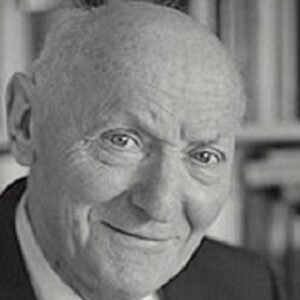Singer was raised in an orthodox Jewish family and was well versed in Jewish prayers, Hebrew, and the Torah and Talmud, the Jewish scriptures, but his view of Judaism was unconventional and complex. Singer began to doubt the existence of a sympathetic God following the Holocaust deaths of fellow Jews, the death of his elder brother from thrombosis, and the death of his younger brother while being deported to Southern Kazakhstan. He avoided traditional religious services but couldn’t shake his roots and belief in a monotheistic God. He gradually developed his own philosophy and religion, which he coined the term ‘private mysticism.’ The majority of his novels and short stories depict the clash of tradition and modern thought, faith and mysticism, and liberalization and nihilism. Though his stories are set in a Jewish context, they contain a universal message. His works explore the autocracy of power, passion, obsession, and the conflict between tradition preservation and renewal. While the majority of his works are written in the nineteenth-century parable style, he modernized them by relating events and people from his era. “The Manor,” “The Estate,” and “The Family Moskat” are frequently compared to Thomas Mann’s novel “Buddenbrooks.” His works have been translated into a variety of languages, including English.
Childhood & Early Life
He was one of Rabbi Pincus Menachem and Bathsheba Zylberman’s four children. He had an elder sister and brother (both of whom went on to become distinguished writers), as well as a younger brother, Moshe.
In 1908, he and his family moved to Krochmalna Street in Warsaw’s Yiddish-speaking poor Jewish district, which became the setting for the majority of his novels.
Following the war, life became difficult for the family. In 1917, he relocated to Bigoray with his younger brother Moshe and mother, while his father, elder brother, and sister remained in Warsaw.
He returned to Warsaw when his father was appointed village rabbi. In 1921, he was enrolled in Tachkemoni Rabbinical Seminary, but could only complete one year of his course.
Career of Isaac Bashevis Singer
In 1923, he began his career as a proofreader with the assistance of his elder brother Joshua, who was an editor for the journal ‘Literarische Bleter.’ He worked as a translator and journalist concurrently.
He had translated into Yiddish the works of eminent European novelists. His translations of Thomas Mann’s “The Magic Mountain” and Erich Maria Remarque’s “All Quiet on the Western Front” are noteworthy.
Between 1933 and 1935, he was an associate editor of “Globus,” a Yiddish literary magazine that serialized his first novel, ‘Satan in Goray.’
He immigrated to New York in 1935 and began working for ‘The Forward,’ a Yiddish-language newspaper targeted at Yiddish readers.
He wrote under the pen name “Bashevis” to honor his mother Bathsheba and to set himself apart from his elder brother, Joshua Singer, who was also a well-known writer.
Significant Works of Isaac Bashevis Singer
His first novel, “Satan in Goray,” was published in 1935, prior to Hitler’s invasion of Poland and the Holocaust. The novel is about Sabattai Zevi, a fictitious messiah. Jacob Sloan translated the novel into English under the author’s supervision.
“The Slave,” published in 1962, was a parody of John Bunyan’s “Pilgrim’s Progress,” a realistic allegory. Jacob, a Jewish scholar who was sold as a slave to a Pagan peasant community, falls in love with Wanda, his master’s daughter.
In 1989, Paul Mazursky filmed and directed his personal novel “Enemies: A Love Story.” The novel chronicles Herman Broder’s life as a Holocaust survivor who has lost faith in religion and life, as well as the complications in his relationships.
“Shosha,” the extraordinary novel that won him the 1978 Nobel Prize for Literature, is about Aaron Greidinger, a young ambitious writer and the son of a Hasidic rabbi.
Awards and Accomplishments
1978 was a watershed year in his life because he was awarded the prestigious Nobel Prize in Literature for his work “Shosha.” It was the highest distinction bestowed on a language on the verge of extinction.
Apart from his Nobel Prize, he has also received the National Book Award for Children’s Literature and Fiction. He also received a Gold Medal for ‘Fiction’ from the “American Academy of Arts and Letters.”
Mr Singer’s Nightmare or Mrs Pupkos Beard was a documentary film directed by Brue Davidson, a renowned photographer, in which the author played a prominent role in addition to writing the script.
Personal History and Legacies
Between 1926 and 1935, he shared an apartment with Runia Shapira, the daughter of a rabbi and a Communist who had been expelled from the USSR for supporting the Zionists. Although the couple never married, they had a son named Israel Zamir in 1929. The couple split up in 1935, when Singer moved to the United States, while Runia relocated to Moscow and eventually to Palestine with her son.
In 1938, he met Alma Wassermann. Their relationship developed into something more, and Alma divorced Wassermann in 1940 and married Singer.
He had affairs with a number of women, including Dvora Menashe, a Hispanic maid, Lester Goran, a University of Miami colleague, and Dvora Menashe, his assistant. Alma patiently endured his infidelity.
He became weakened following a series of strokes and died on July 24, 1991.
This renowned author is commemorated with a street in Surfside, Florida.
The University of Miami awards scholarships to undergraduate students in recognition of his literary accomplishments.
Estimated Net Worth
Isaac is one of the wealthiest novelists and is ranked as one of the most popular novelists. Isaac Bashevis Singer’s net worth is estimated to be around $1.5 million, based on our analysis of Wikipedia, Forbes, and Business Insider.
Trivia
This Yiddish author became a vegetarian in his later years and stated, “I became a vegetarian not for my own health, but for the health of the chickens.”
This Nobel Laureate earned the wrath of his Yiddish contemporaries when he wrote about the homosexual relationship between rabbis, Hasids, and Yeshiva boys.


